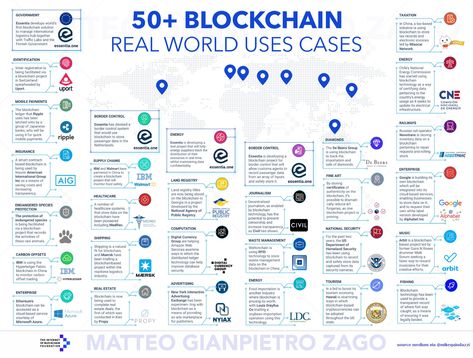Blockchain Beyond Cryptocurrency: Uncovering Novel Use Cases
Blockchain technology, initially associated solely with cryptocurrencies like Bitcoin, has evolved tremendously to encompass a vast spectrum of innovative applications beyond the realm of digital finance. This decentralized, distributed ledger system offers an immutable and transparent record-keeping mechanism, enabling the secure and efficient tracking of transactions and data across various industries. By leveraging blockchain’s unique capabilities, businesses and organizations are unlocking novel use cases that redefine digital interactions and transform traditional processes.

Supply Chain Management:

Blockchain’s ability to provide a tamper-proof and auditable record of supply chain transactions transforms inventory management practices. By creating a shared, immutable ledger, all stakeholders can access real-time information about product provenance, authenticity, and logistics, enhancing transparency and accountability. This not only reduces the risk of counterfeit goods but also streamlines supply chain processes, optimizing inventory levels and reducing costs.
Healthcare:
The healthcare industry has embraced blockchain to create secure and interoperable platforms for managing sensitive patient data. By tokenizing medical records, blockchain enables secure sharing of information between healthcare providers, patients, and researchers. This enhances patient privacy while facilitating personalized treatments, data-driven drug research, and improved clinical trials. Additionally, blockchain-based supply chain solutions can ensure the integrity and traceability of pharmaceuticals, ensuring patient safety and reducing fraud.
Government and Governance:
Governments worldwide are exploring blockchain to enhance the transparency and accountability of public processes. Voting systems powered by blockchain can ensure secure and accurate elections, while digital land registries and property title management systems improve efficiency and reduce corruption. By providing a transparent and tamper-proof platform for government transactions, blockchain fosters trust and promotes citizen participation.
Identity Management:
Blockchain’s secure and verifiable nature has the potential to revolutionize identity management systems. By creating self-sovereign digital identities, individuals can securely control their personal data and authenticate themselves across various platforms. This eliminates the need for passwords and reduces the risk of identity theft, enhancing digital privacy and convenience.
Digital Transformation:
Businesses of all sizes are embracing blockchain to digitize and streamline their operations. Smart contracts automate contract execution and payments, reducing the need for intermediaries and minimizing disputes. Non-fungible tokens (NFTs) enable the creation and trading of unique digital assets, opening up new avenues for innovation in digital art, collectibles, and virtual worlds. Additionally, blockchain-powered decentralized autonomous organizations (DAOs) provide a transparent and democratic platform for collaborative decision-making and resource management.
Conclusion:
Blockchain technology has far-reaching implications beyond cryptocurrencies. Its decentralized, immutable, and transparent nature offers a transformative foundation for diverse applications. By unlocking novel use cases across industries, blockchain empowers businesses, organizations, and individuals to revolutionize processes, enhance security, and forge a more secure and efficient digital landscape. As blockchain continues to evolve and integrate with other technologies, its potential for innovation and disruption remains boundless, shaping the future of digital interactions and redefining the very fabric of our society.## Blockchain Beyond Cryptocurrency: Uncovering Novel Use Cases
Executive Summary
Blockchain technology has swiftly evolved beyond its initial association with cryptocurrency, unveiling a plethora of transformative applications across diverse industries. This extensive article delves into five compelling use cases that showcase the multifaceted potential of blockchain, ranging from supply chain optimization to healthcare advancements and secure digital identities. By harnessing the immutable, decentralized nature of blockchain, organizations can unlock unprecedented levels of transparency, efficiency, and trust, paving the way for a more secure and connected future.
Introduction
Blockchain, the underlying technology behind Bitcoin and other cryptocurrencies, has captured the attention of businesses worldwide. Its distributed ledger system, which records transactions in a secure and tamper-proof manner, offers a transformative foundation for a wide range of applications beyond the financial realm.
The Top 5 Subtopics
1. Supply Chain Management
Blockchain can revolutionize supply chains by providing a shared, immutable ledger that tracks every step of product movement from origin to delivery. Key benefits include:
- Enhanced Transparency and Traceability: Accurate tracking of goods can prevent counterfeiting, reduce fraud, and enable real-time visibility into supply chain operations.
- Improved Efficiency: Automated processes can streamline operations, reduce errors, and speed up the flow of goods through complex supply chains.
- Increased Accountability: Blockchain creates a transparent record of responsibilities, fostering accountability and improving compliance.
2. Healthcare
Blockchain’s decentralized nature provides secure and efficient solutions for managing medical records, ensuring data accuracy and patient privacy:
- Secure and Immutable Medical Records: Sensitive patient information can be stored and shared securely, preventing unauthorized access or manipulation.
- Efficient Data Exchange: Interoperable systems can seamlessly share patient records between healthcare providers, expediting diagnosis and treatment decisions.
- Precision Medicine: Blockchain can enable personalized treatments by tracking genetic data and providing insights for tailored healthcare approaches.
3. Identity Management
Blockchain-based digital identities empower users to control their personal information, reducing fraud and enhancing user privacy:
- Self-Sovereign Identities: Individuals own and manage their digital identities, eliminating the need for third-party verification and minimizing identity theft risks.
- Increased Security: Cryptographic signatures and decentralized storage ensure that personal information is protected from unauthorized access and breaches.
- Improved Authentication: Blockchain-based authentication provides strong safeguards against phishing and other cyberthreats.
4. Voting Systems
Blockchain can transform voting processes, enhancing accuracy, security, and transparency:
- Secure and Verifiable Elections: Blockchain ensures the integrity of votes by providing a tamper-proof record of all transactions.
- Reduced Fraud and Disputes: Transparent and immutable ledger systems prevent fraudulent activities and enable efficient dispute resolution.
- Convenience and Accessibility: Online voting platforms based on blockchain can increase voter participation and improve accessibility for remote or disabled individuals.
5. Gaming and Digital Assets
Blockchain technology empowers gamers and digital asset creators with ownership, scarcity, and interoperability:
- Unique and Verifiable Digital Assets: Non-fungible tokens (NFTs) create unique and verifiable digital assets, such as in-game items or artwork.
- Scarcity and Value: Blockchain-based scarcity mechanisms can control the creation and distribution of digital assets, creating potential value appreciation.
- Interoperable Gaming Experiences: Cross-platform gaming experiences become possible through the use of shared blockchain networks.
Conclusion
Blockchain technology offers transformative possibilities beyond cryptocurrency, empowering industries with novel use cases that enhance transparency, efficiency, and trust. From optimizing supply chains to securing healthcare data and revolutionizing identity management, blockchain is poised to redefine the way we conduct business, interact with healthcare systems, and protect our digital identities. As blockchain technology continues to evolve, we can anticipate even more groundbreaking applications that shape the future of various industries.
Keyword Tags
- Blockchain use cases
- Supply chain management
- Digital identity
- Healthcare
- Voting systems


